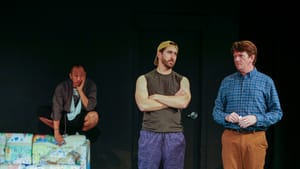Stay in the Loop
BSR publishes on a weekly schedule, with an email newsletter every Wednesday and Thursday morning. There’s no paywall, and subscribing is always free.
Ahead of the pack
Theatre Exile presents Hansol Jung’s Wolf Play

In Wolf Play, the poetically elliptical family drama that opens the season at Theatre Exile, the title character regularly repeats a Korean proverb: “Naturally the arms fold inward.” Playwright Hansol Jung shows the ways that such an embrace can feel like both a hug and a chokehold.
It also seems like a suspiciously profound observation for a six-year-old, but Wolf, we quickly learn, is more than he appears to be. The multitudes he contains begin with his name, which may be Peter, Jeenu, or simply Wolf, depending on whom you ask. The question of his species is even more complicated. In presenting the intricacies of custodial bonds and chosen families, Jung blends metaphors of adoption and adaptation, leaning heavily on the social yet enigmatic canine creature that gives the play its title.
The complications of parenthood
Makoto Hirano, an adult actor who moves around the stage with an almost spectral grace, embodies the boy, sometimes with the aid of a puppet whose realistic qualities reside somewhere in the uncanny valley. (Sebastienne Mundheim is the puppet designer.) Adopted as an infant by Peter (Keith Conallen) and his unseen wife, he’s disposed of when the couple conceive a biological child of their own. Rather than dealing with courts and custody, Peter sells the child to Robin and Ash (Kira Player and Bruce Baldini), a queer couple in San Francisco.
Ash—a bantamweight boxer on the brink of turning pro—is nonbinary, and even while abandoning Wolf, Peter worries about the boy growing up in a household without a traditional father figure. Jung uses this central point to explore the complicated boundaries of parenthood, including separation and attachment, proper child development, and the necessity of subverting your own needs for the good of the clan.
A lupine lens
The degree to which we’re meant to take the wolf symbolism seriously remains unclear throughout the play. In a puckish opening monologue, Hirano limns fact and fiction, asking audience members to envision themselves as untethered to the earth before reminding them that what they’re watching is merely a play. But the sense that you can feel like something you’re not—an animal rather than a human, an alien instead of a fully-fledged pack member—resonates as Jung considers the ways that families are constructed and destroyed.
Does Wolf keep wetting the bed in his new home as a sign of separation anxiety from his adoptive father—or is he marking his territory? Does he form a compelling bond with Ash because he views them as the alpha, the ticket out of lone-wolf status? And what does Ash’s complicated embrace of parenthood say about their identity as an athlete, a spouse, and a human being with a formerly solid self-image?
Tender and realistic
Deborah Block’s briskly staged production reflects on these fraught topics with a healthy mix of seriousness and playfulness. Colin McIlvaine’s scenic design, featuring cartoonishly painted appliances and a moveable boxing ring, lends a sense of satire to even the heaviest scenes, as when Peter and Robin’s brother Ryan (an appropriately smarmy Matteo Scammell) team up to return Wolf to the conventional confines of heterosexual suburbia. Jung’s script and Block’s expert pacing give all the characters the room to make their inner feelings known, no matter how uncomfortable it makes them or unlikeable it renders them to the audience.
But in boxing parlance, the relationship between Wolf and Ash is the main event, and Hirano and Baldini render it with an aching tenderness. Wolf the puppet boy is as reserved as his interlocutor is loquacious, but Hirano shows how he acquires words and confidence as his connection to Ash grows. Baldini demonstrates how a genuine connection with another person can allow a guarded individual to drop the walls for the first time.
It's a superbly sweet focal point in a play that is often unapologetically harsh. In both those modes, Wolf Play is as realistic as life itself. Arms naturally fold inward, whether to harm or to heal.
What, When, Where
Wolf Play. By Hansol Jung, directed by Deborah Block. $10-$40. Through November 20, 2022, at Theatre Exile, 1340 South 13th Street, Philadelphia. (215) 218-4022 or theatreexile.org.
Proof of vaccination is required to attend. Masks are required in the theater.
Accessibility
Theatre Exile’s performance space is fully accessible, with all-gender restrooms.
Sign up for our newsletter
All of the week's new articles, all in one place. Sign up for the free weekly BSR newsletters, and don't miss a conversation.

 Cameron Kelsall
Cameron Kelsall